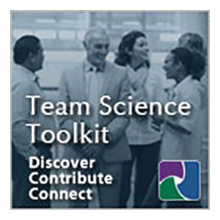- Home
- About
- Membership
- Special Interest Groups
- Conferences
- 2025 SciTS Conference
- 2024 SciTS Conference
- 2023 Scits Conference
- 2022 SciTS Conference
- 2021 SciTS Conference
- 2020 SciTS Conference
- 2019 SciTS Conference
- 2018 SciTS Conference
- 2017 SciTS Conference
- 2016 SciTS Conference
- 2015 SciTS Conference
- 2014 SciTS Conference
- 2013 SciTS Conference
- 2012 SciTS Conference
- 2011 SciTS Conference
- 2010 SciTS Conference
- Past SciTS Conference Photos
- Contact Us
Featured Speakers/PanelThe 2017 Science of Team Science (SciTS) Conference Planning Committee is pleased to announce our initial list of featured speakers for this year’s conference on June 12-14, 2017 in Clearwater, FL. We have brought together an eclectic group of experts who study and/or manage complex scientific collaborations. Our goal with this set of speakers is to help our attendees both learn about new developments in the study of teams as well as gain insights from those who have successfully addressed the challenges that arise when leading and coordinating a variety of stakeholders collaborating in science. Keynote Speaker – Dr. James OldsOur keynote for this year’s conference will be Dr. James Olds, Assistant Director of the Directorate for Biological Sciences (BIO) with the National Science Foundation. In this position, Dr. Olds is responsible for helping to conceptualize and fund a variety of complex team science initiatives. Olds is also director and chief academic unit officer at the Krasnow Institute for Advanced Study at George Mason University, a position he has held for 15 years. He is also the Shelley Krasnow University Professor of Molecular Neuroscience. The international Decade of the Mind project was begun under his leadership at Krasnow, which helped shape former President Obama's BRAIN Initiative. Featured Speaker – Heidi K. Gardner, Ph.D.Dr. Heidi K. Gardner, is a Distinguished Fellow in the Center on the Legal Profession at Harvard Law School. She also serves as a Lecturer on Law and the Faculty Chair of the school’s Accelerated Leadership Program executive course. Dr. Gardner’s research focuses on leadership and collaboration and her book, “Smart Collaboration: How Professionals and Their Firms Succeed by Breaking Down Silos” was just published by Harvard Business Press in January 2017 (http://amzn.to/2n8zEvS). Her research has also been published in the Academy of Management Journal, Administrative Science Quarterly, and Harvard Business Review and her work was awarded the Academy of Management’s prize for Outstanding Practical Paper with Implications for Management. She has degrees in organizational behavior from the London Business School, and she has been a Fulbright Scholar and an International Research Fellow at Oxford University. Featured Speaker – Jakob Zinsstag-Klopfenstein, Ph.D.Dr. Jakob Zinsstag-Klopfenstein is a veterinarian in tropical animal health. He is past-president of the International Association for Ecology and Health and president of the scientific board of the Transdisciplinary Network of the Swiss Academies. Since 1998 he heads a research group on human and animal health at the Swiss Tropical and Public Health Institute. Since 2011 his is deputy head of department of Epidemiology and Public Health at Swiss TPH. He focuses on the control of zoonoses in developing countries and the provision of health care to mobile pastoralists. He has helped to develop the “One Health” approach to research and practice and is co-editor of the book “One Health: The Theory and Practice of Integrated Health Approaches” (http://amzn.to/2ly0lOe). One Health is complex collaborative research effort requiring coordination amongst scientists, medical practitioners, stakeholders and citizens, in order to improve human and animal health. Featured Speaker – Dr. Suzanne BellDr. Bell is faculty with the Industrial & Organizational Psychology program at DePaul University. Dr. Bell is an internationally renowned expert in team composition and building team human capital via the selection, placement, training, and development of team members. She has published on a variety of topics including conducting actionable research on “extreme teams”, composing cohesive teams, as well as the relationship between personality and cognition and coordination in teams. Featured Speaker – William "Brandon" Vessey, Ph.D.Dr. William “Brandon” Vessey is currently the Deputy Element Scientist for Flight Analogs with NASA’s ISS Medical Project at the Johnson Space Center, providing scientific oversight for ground-based spaceflight analog studies. His primary research interests fall into the broad categories of teams, leadership, and creativity, with specific focus on teamwork over long duration space missions, team leadership, and collective leadership. He is co-editor of a recent scholarly volume, “Team Cohesion: Advances in Psychological Theory, Methods and Practice”, that discusses cutting edge developments in research on the attitudinal factors in teams driving successful performance (http://bit.ly/2mvnTCu). Panel: Cross-disciplinary Collaboration in Digital HumanitiesPanelists: Bruce Janz, Moderator, University of Central Florida; Scot French, University of Central Florida; Julian Chambliss, Rollins College, Julie Thompson Klein, Wayne State University This panel will define and demonstrate collaborative research and education in the cross-disciplinary field of Digital Humanities. It will establish a framework for collaborative research and education that bridges humanities and technology. The framework crosses three levels: individual teams, a state-wide consortium, and inter/national networks. As a prelude to the November 2017 conference of HASTAC, hosted by the Florida Digital Humanities Consortium, it will focus on projects within the state. HASTAC is the international network Humanities, Arts, Science, and Technology and Alliance and Consortium. The panel will feature presentations and discussion of three overriding questions with the audience: (1) What similarities exist between collaboration in humanities and in science, medicine, and health? (2) What differences exist? (3) How might SciTS and HASTAC as well as other Digital Humanities networks exchange insights and resources to extend understanding of the “science” of team science to include its “art” and “craft”?
|

